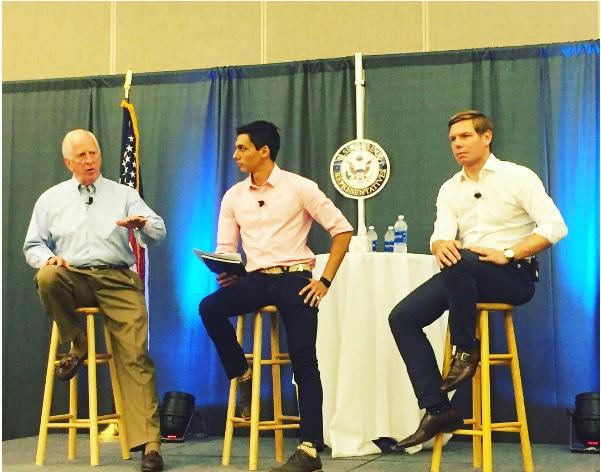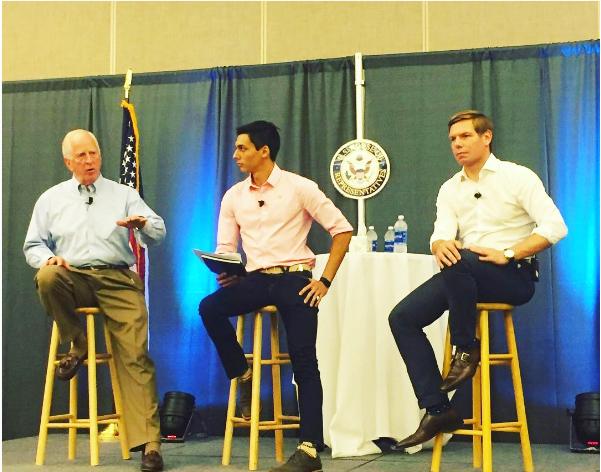Representative Mike Thompson and Eric Swalwell, a Congressman from the East Bay, visited Sonoma State Thursday to engage in a conversation about the issues facing young Americans.
The town hall style meeting was part of a listening tour called the Future Forum, which is a group of democratic members of Congress committed to listening to and standing up for the next generation of Americans, according to the Future Forum webpage. Eric Swalwell, the Future Forum chair, is the representative for California’s15th district located in the East Bay.
Mike Thompson’s congressional fifth district stretches across the North Bay and includes Sonoma State University.Students at this university are his constituents.
Many of the audience members came to listen to two government officials speak, but the U.S. congressman were more interested in hearing what the audience was concerned about.
“[The forum is] an attempt to bridge gaps so Congress can know what millennials are thinking about.” said Thompson.
The wide-ranging discussion began with a question about mental health. The question asked what Congress was doing to help mental health on college campuses, an issue pertinent to many at Sonoma State. Swalwell asked the audience to raise their hands if they knew somebody who needed mental health help, but had not received it. About half of the crowd raised their hands.
An audience member claimed Counseling and Psychological Services (CAPS) needs more resources, citing there is a waitlist to get an appointment in CAPS. Thompson responded by saying the California State University system needs more mental health resources.
During the town hall meeting, audience members were asked to text in their biggest concerns. These concerns were compiled into a word bubble displayed next to the stage. In the middle of the word bubble, the largest word stood out: debt. Student debt took center stage in the discussion.
Swalwell, someone with his own personal student debt, voiced his concern over the issue and offered a few reforms that could happen. Swalwell listed the drawbacks of too much student debt, linking it to home ownership. He believes since there is so much student debt, the economy is being held back.
Swalwell asked the crowd to raise their hands if they expected to have greater than $10,000 in debt. Well over half of the crowd raised their hand. When he raised the number to $25,000, many hands were still raised. This unofficial survey yielded alarming results, showing why this issue mattered.
Members of the audience took turns sharing their stories of student debt holding them back from higher education.
To fix this problem, Swalwell said we should have much lower interest rates on these loans. He proposed cutting the rates in half.
“You should be able to discharge your student loan if you fall into hard times and bankruptcy,” said Swalwell.
You can currently do this with all other loans, but it is not an option for student loans. Swalwell said he thinks it’s realistic for college to be debt-free, because it was not too long ago.
Both congressmen agreed that funding for Pell Grants should be expanded, echoing the sentiments of the crowd.
For over an hour and a half, the two congressman covered a wide range of topics. Police brutality, troops in Afghanistan, the SMART train, along with voter turnout were all discussed.
The forum provided all with an opportunity to address the congressman about any issue. Student Aracely Ramos was wary of the event. She believes politics is all talk and no action.
“They said the basics, and [student debt] obviously needs to be lowered,” she said, but was skeptical of any change actually happening.
Future Forum was an effective discussion of the issues facing young Americans.
“Our purpose was not to preach to you, just to hear about the issues,” said Thompson.
They ended the forum with a call to vote, with Swalwell saying, ‘If you don’t want student debt, you should probably vote.”





![[Both photos courtesy of sonoma.edu]
Ming-Ting Mike Lee stepped in as the new SSU president following Sakakis resignation in July 2022](https://sonomastatestar.com/wp-content/uploads/2024/04/CC4520AB-22A7-41B2-9F6F-2A2D5F76A28C-1200x1200.jpeg)



























